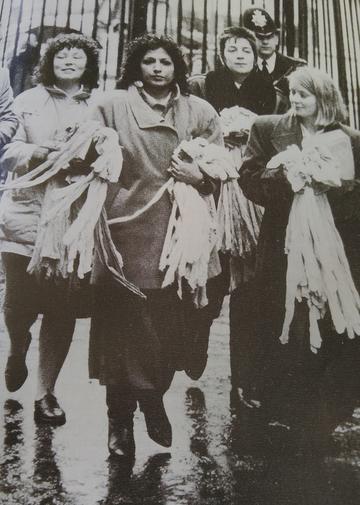
Leicester outworkers campaigning at Downing Street, late 1980s
© Homeworkers Worldwide
Supervisory team: Dr Helen McCarthy (Faculty of History, University of Cambridge) and Dr Lucy Brill (Homeworkers Worldwide)
Open-Oxford-Cambridge AHRC DTP-funded Collaborative Doctoral Award at the University of Cambridge, in partnership with Homeworkers Worldwide (HWW).
The award will enable the holder to conduct cutting-edge historical research on homeworking (waged labour performed by workers inside their own homes) in and beyond Britain since the 1970s. This is a timely subject, given the major shift towards home-based work prompted by the current Covid-19 pandemic. Yet waged work inside the home has a long history stretching back to the nineteenth century, when the low-paid labour of homeworkers (mostly women) proved integral to the development of many consumer industries including clothing, millinery, and box-making.
This Victorian world of sweated labour has been well-researched, but homeworking in more recent times has not attracted sustained attention from historians. This is despite the revival of homework in clothing and other industries during the 1970s and 1980s as UK manufacturers sought ways to compete with emerging industries in the global South, and the emergence of new kinds of white-collar homework enabled by information and communication technologies. These developments fostered a vibrant grassroots movement in Britain as well as global networks of support and activism amongst homeworkers and their advocates. These activists provided practical support to homeworkers and lobbied governments, employers and intergovernmental organisations for strengthened protections and employment rights. HWW continues to take this work forward in the present day.
Making central use of HWW’s rich archive, this PhD project offers an opportunity to locate the history of homework in the shifting landscape of labour markets, workplace technologies and non-governmental activism since the1970s. The research has the potential to contribute a much-needed historical perspective to wider bodies of scholarship on precarious labour (including ‘platform’ work and ‘crowdwork’), gender and employment, and workplace organising in both past and present. The award-holder will develop their own research focus, guided by the archival sources, but potential areas could include:
- Political advocacy on homeworking and labour rights in the UK, Europe and globally
- Homeworking, consumer activism and the ethical trade movement
- Art, photography and homeworking activism
- Relationships between homeworker-activism and feminist organising
- Activism amongst black, Asian and other minority-ethnic homeworkers in Britain
- Homeworking and disability
- Technology and homeworking, including ‘telework’
- Trade union activism and homeworking
A key element of the project is an intensive engagement with the HWW’s archive, some of which has been deposited with the Feminist Archive North at the Brotherton Library in Leeds, whilst the rest is hosted at the HWW’s office, also based in Leeds. The successful applicant will be expected to devote considerable time to exploring and organising this material, with training provided as necessary. In addition to researching a doctoral thesis, the award-holder will bring their historical knowledge to bear on HWW’s current advocacy work and will develop impact activities designed to engage a diverse set of publics.
The award holder will be based at the Faculty of History in Cambridge, with regular periods of time spent at HWW’s office in Leeds. Supervision is provided by Dr Helen McCarthy and Dr Lucy Brill.